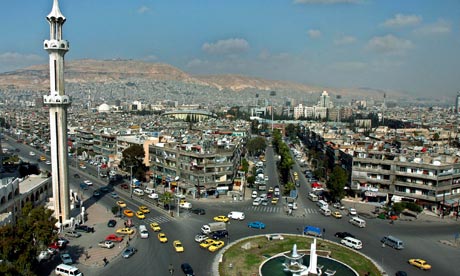
Syrian jets bombed parts of Damascus Monday in what residents said were the capital's fiercest air raids yet, underlining the collapse of a truce proposed by peace envoy Lakhdar Brahimi.
"More than 100 buildings have been destroyed, some leveled to the ground," said opposition activist Moaz al-Shami, who said he had witnessed three air raids in the northeastern suburb of Harasta alone. "Whole neighborhoods are deserted."
Syrian state television said a "terrorist car bomb" had killed 10 people, including women and children, near a bakery in Jaramana — a southeastern district of Damascus controlled by forces loyal to President Bashar al-Assad.
Each side blamed the other for breaking the four-day truce for the Muslim holiday of Eid al-Adha, which swiftly broke down.
"I am deeply disappointed that the parties failed to respect the call to suspend fighting," UN chief Ban Ki-moon said in South Korea, where he received the Seoul Peace Prize.
"This crisis cannot be solved with more weapons and bloodshed … the guns must fall silent," Ban said.
Brahimi, after meeting Russian Foreign Minister Sergei Lavrov in Moscow, voiced regret at the fate of the cease-fire, but said it would not deter him from pursuing peace efforts.
Although the Syrian military and several rebel groups accepted the plan to stop shooting over Eid al-Adha, which ends Monday, it failed to stem the bloodshed in a 19-month-old conflict that has already cost at least 32,000 lives.
According to the Syrian Observatory for Human Rights, an opposition watchdog, 420 people have been killed since Friday.
Scenes of devastation
Damascus residents reported air raids on the suburbs of Qaboun, Zamalka and Irbin overnight and Monday which they said were the heaviest since jets and helicopters first bombarded pro-opposition parts of the Syrian capital in August.
"Even electricity poles have been hit and they are lying among pools of water from burst pipes. There is no food, water, electricity or telephones," said Shami, the activist in Harasta. "Army snipers surround Harasta National Hospital and no one can move from one street to another without risking being shot."
Shami said Free Syrian Army rebels still held most of the area, but their anti-aircraft guns could not hit the warplanes.
State media said insurgents never respected the truce.
"For the fourth consecutive day, the armed terrorist groups in Deir al-Zor continued violating the declaration on suspending military operations, which the armed forces have committed to," state news said, later adding that rebels had also attacked government forces in Aleppo and the central city of Homs.
The Damascus air raids followed what residents said were failed attempts by troops to storm eastern parts of the city.
"Tanks are deployed around Harat al-Shwam [district], but they haven't been able to go in. They tried a week ago," said an activist who lives near the area and who asked not to be named.
Brahimi, who will visit Beijing after Moscow, said the renewed violence in Syria would not discourage him.
"We think this civil war must end … and the new Syria has to be built by all its sons," he said. "The support of Russia and other members of the Security Council is indispensable."
Russia and China have vetoed three Western-backed UN draft resolutions condemning Assad's government for the violence.
Beijing, keen to show it does not take sides in Syria, has urged Damascus to talk to the opposition and meet demands for political change. It has advocated a transitional government.
Big-power rifts have paralyzed United Nations action over Syria, but Assad's political and armed opponents are also deeply divided, a problem which their Western allies say has complicated efforts to provide greater support.
Syrian opposition figures, including Free Syrian Army commanders, started three days of talks in Istanbul Monday in the latest attempt to unite the disparate groups.




